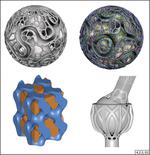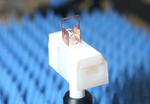Other

“The U.S. Department of Commerce’s National Institute of Standards and Technology (NIST) has chosen the first group of encryption tools that are designed to withstand the assault of a future quantum computer, which could potentially crack the security …

“New study reveals that 2D interfaces in future transistors may not be as flat as previously thought. Transistors are the building blocks of modern electronics, used in everything from televisions to laptops. As transistors have gotten smaller and more compact …

“Since the 1940s, engineers have used a common design language — a set of definitions, symbols and practices — to draft engineering drawings that can serve as clear manufacturing blueprints or inspection checklists. While this system still works well for many traditional …

“Researchers at the National Institute of Standards and Technology (NIST) have boosted the sensitivity of their atomic radio receiver a hundredfold by enclosing the small glass cylinder of cesium atoms inside what looks like custom copper “headphones.” The structure — a …

“Settling a key dispute in the wireless communications field, researchers at the National Institute of Standards and Technology (NIST) found that transmission performance is consistent across different bands of the millimeter-wave (mmWave) spectrum targeted for high-speed, data-rich 5G systems. Wireless …

“Drawing lessons from the compound eyes of trilobites, NIST researchers fabricate tiny lenses that see both near and far. Five hundred million years ago, the oceans teemed with trillions of trilobites — creatures that were distant cousins of horseshoe crabs. All …

“JILA physicists have measured Albert Einstein’s theory of general relativity, or more specifically, the effect called time dilation, at the smallest scale ever, showing that two tiny atomic clocks, separated by just a millimeter or the width of a …
“The nation should bolster research and development of systems that distribute accurate time via fiber-optic cable and radio as part of the effort to back up GPS and enhance the resilience of critical infrastructure that depends on it, according to …

“JILA researchers have tricked nature by tuning a dense quantum gas of atoms to make a congested “Fermi sea,” thus keeping atoms in a high-energy state, or excited, for about 10% longer than usual by delaying their normal return to …

“Researchers at the National Institute of Standards and Technology (NIST) and collaborators have devised and tested a new, highly sensitive method of detecting and counting defects in transistors — a matter of urgent concern to the semiconductor industry as it develops …
